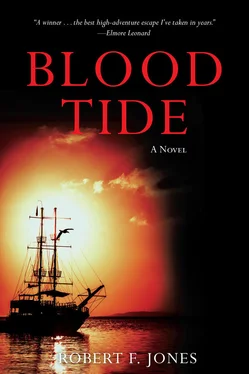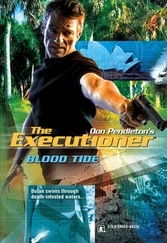Robert Jones - Blood Tide
Здесь есть возможность читать онлайн «Robert Jones - Blood Tide» весь текст электронной книги совершенно бесплатно (целиком полную версию без сокращений). В некоторых случаях можно слушать аудио, скачать через торрент в формате fb2 и присутствует краткое содержание. Год выпуска: 2014, Жанр: Старинная литература, на английском языке. Описание произведения, (предисловие) а так же отзывы посетителей доступны на портале библиотеки ЛибКат.
- Название:Blood Tide
- Автор:
- Жанр:
- Год:2014
- ISBN:нет данных
- Рейтинг книги:5 / 5. Голосов: 1
-
Избранное:Добавить в избранное
- Отзывы:
-
Ваша оценка:
- 100
- 1
- 2
- 3
- 4
- 5
Blood Tide: краткое содержание, описание и аннотация
Предлагаем к чтению аннотацию, описание, краткое содержание или предисловие (зависит от того, что написал сам автор книги «Blood Tide»). Если вы не нашли необходимую информацию о книге — напишите в комментариях, мы постараемся отыскать её.
Blood Tide — читать онлайн бесплатно полную книгу (весь текст) целиком
Ниже представлен текст книги, разбитый по страницам. Система сохранения места последней прочитанной страницы, позволяет с удобством читать онлайн бесплатно книгу «Blood Tide», без необходимости каждый раз заново искать на чём Вы остановились. Поставьте закладку, и сможете в любой момент перейти на страницу, на которой закончили чтение.
Интервал:
Закладка:
At night they slipped aboard Japanese vessels where they lay at anchor in the islands and cut the crews’ throats, taking their testicles as trophies. They mined harbor entrances with stolen Japanese contact mines. They wiped out whole garrisons of Japanese occupation troops on the smaller islands. They sank a Japanese troopship carrying reinforcements to beleaguered Leyte in the fall of 1944, using a twenty-four-inch oxygen-propelled Japanese torpedo taken from a light cruiser, the Abukuma , that with fitting justice had been crippled by a U.S. PT boat in the Battle of Surigao Strait. The seas around the wreck boiled with feeding fish for weeks afterward. When the Japanese withdrew from the Philippines, Commodore Millikan’s sea guerrillas combed the evacuated islands mercilessly, killing every Japanese straggler they found. And they found them all. The stragglers did not die swiftly.
Commodore Millikan rejoined the U.S. Navy. As Lieutenant (j.g.) Downes, he was killed at Okinawa the following year, when a kamikaze hit the gun mount he commanded aboard an attack transport anchored in Buckner Bay.
But the ONI, recognizing the value of the Millikan legend, reactivated the title after the war, when the pro-Communist Hukba-lahap movement flared in the Philippines. Another commodore was dispatched to San Lázaro and welcomed with great warmth. The Tausuqs had enjoyed the war. They’d never had so much fun before, at least since the Spanish left.
The Huk movement died down. Southeast Asia flared up. The southern Philippines, always rebellious, never totally under Manila’s control even in Spain’s long day, lie close to the Asian mainland, a natural and political soft spot in the flank of America’s most prized Pacific ally. A third Commodore Millikan replaced the second, just to make sure the Commies didn’t try any cute stuff down there.
Men age and die; bureaucracies live forever. When the U.S. pulled back from Vietnam in 1973, there was no need to maintain the Millikan force in the Sulu Sea. But you never can tell. The operation, after all, was inexpensive, self-sustaining in large part through the very institutions that sustained the Tausuq. Smuggling really hurt no one but the Manila government, and the U.S. was already pumping millions into the Malacañang Palace, anyway. Slavery was a way of life among Moslems that would continue regardless of a Commodore Millikan’s presence. And what the hell, a little piracy never hurt anyone. The commodore remained on station.
When Magellan first spied the archipelago that would be named the Philippines, on March 15, 1521, Islam was still moving northward through the islands. Though Spain stopped that movement, she never quite quelled it. From Mindanao south through Basilan and the Sulu archipelago, and through all of Palawan below Puerto Princesa, Moro insurgency continued to smolder, but at low heat, localized, endemic. Then, when Ferdinand Marcos imposed his arbitrary but Draconian martial law on the nation in the early 1970s, the insurgency flared to real rebellion. A Moro National Liberation Front was formed, well organized, armed with modern automatic weapons and explosives, demanding an autonomous Moslem nation for the southern Philippines and willing to wreak terror to win it.
Grenades blew at night, then in restaurants at sundown. Sugar plantations controlled by absentee landlords out of Manila flared sweetly under the pirate wind. Small-town alcaldes woke briefly in the hot, dark, insect-singing night to find their throats cut ear to ear. Army convoys never reached their new posts, and sent their oily, flesh-scented smoke to mix with that of the plantations and restaurants and movie houses. Sulu Sea mundo grew bolder, attacking even tankers and freighters as they steamed slowly up the Sulu toward Manila. Planners in Washington began muttering the unholy litany—Qadafi, Arafat, Khomeini. It couldn’t be local, it made no sense, how could a cluster of scruffy islands with little or no mineral wealth, oil, or industry hope to forge a self-sustaining nation?
Well, what if the rebellion succeeded? The Moro nation could never last. Its very existence would demand aid from the rest of the Moslem world, especially those parts of it most troublesome to American interests. Let Qadafi, Khomeini & Co. bleed themselves even paler into the wide, blue Sulu Sea. The real importance of the Philippines lay to the north—strategically with the U.S. strongholds at Subic Bay and Clark Air Base, economically with the markets for American trade in populous Luzon and the other big islands. Marcos would keep them in line.
Then Marcos fell.
The faint click of dominoes was heard once more in the corridors of Washington. But this time they were falling from different directions. Certain thinkers at certain agencies suddenly remembered the Millikan force. It might be well—a kind of insurance—to strengthen that little operation. Always good to have a foothold, small as it might be, deep in enemy territory. From tiny beachheads whole reconquests grow . . .
Commodore Millikan IV thought of all this as he lay in a hammock one hot, humid morning under the nipa roof of his veranda. An ice-cold bottle of San Miguel stood balanced on his flat belly, puddling coolly into his naval. It was the hour between the land breeze and the sea breeze, and though he was wearing only a sarong, he wished the sea breeze would hurry up. In the still air he could hear church bells pealing from the ancient stone cathedral in San Lázaro City. The fifth Sunday of Lent was fast approaching, the feast day of Saint Lazarus, the island’s patron. Like many a Commodore Millikan before him, he thought of the irony—or perhaps it was a historical portent—implicit in that name.
Magellan had discovered the Philippines on the Feast of San Lázaro. In keeping with Spanish nautical custom of the day, he’d named the entire archipelago for Lazarus. It was not until 1542, fully twenty-one years later, that the islands had been renamed for the infante of Spain, Don Felipe— las Islas Filipinas . As far as Commodore Millikan knew, his little island deep in the heart of Asian Islam was the only one that still bore the original European name of the place. Perhaps though, in the months and years to come, the name might once again reverberate with geopolitical significance throughout the Indies, symbol and tocsin of a new resurrection. And he’d be the man to arouse it.
The Catholic population of San Lázaro was small—there was a tiny Buddhist colony on the island as well, along with a dwindling population of pagan animists on nearby Balbal—but like all Filipino Catholics, the Lazareños were very devout. Passing the cathedral on his way to or from the Millikan Shipping offices, he sometimes saw penitentes , grown men, not your usual soft-minded old women or pubescent boys confusing religious ardor with sexuality, stumping across the crushed-coral square and up the stone steps on their raw, bleeding knees to pray at the statue of Lazarus in the cathedral’s gloomy nave. He’d gone in there once to look at the statue. It was carved of wood and painted a ghastly, bilious blue-green, a scrawny, limp, dead old man in the last stages of rot, his skin—his very flesh, it seemed—flaking away onto his winding sheet. Yet the old man’s eyes (they must have been carved of some local semiprecious stone) were alive, a bright, sparkling, almost vengeful sea green. The rough coral prie-dieu before the statue was worn smooth by the knees of past penitents. The grooves were brown with the blood of stale sins.
This Commodore Millikan was nominally a Protestant of the Congregational persuasion, but he hadn’t been to church since he left the naval academy, except when duty required it. Over the years he’d prayed, or pretended to, in Buddhist temples, Jewish synagogues, Moslem mosques, and even, once—ironically—in an austere Dutch Reformed chapel in the Namib Desert of South-West Africa. That wasn’t long ago, and he’d prayed sincerely that white-hot morning. He was on his way north from Windhoek to the Angolan border.
Читать дальшеИнтервал:
Закладка:
Похожие книги на «Blood Tide»
Представляем Вашему вниманию похожие книги на «Blood Tide» списком для выбора. Мы отобрали схожую по названию и смыслу литературу в надежде предоставить читателям больше вариантов отыскать новые, интересные, ещё непрочитанные произведения.
Обсуждение, отзывы о книге «Blood Tide» и просто собственные мнения читателей. Оставьте ваши комментарии, напишите, что Вы думаете о произведении, его смысле или главных героях. Укажите что конкретно понравилось, а что нет, и почему Вы так считаете.












